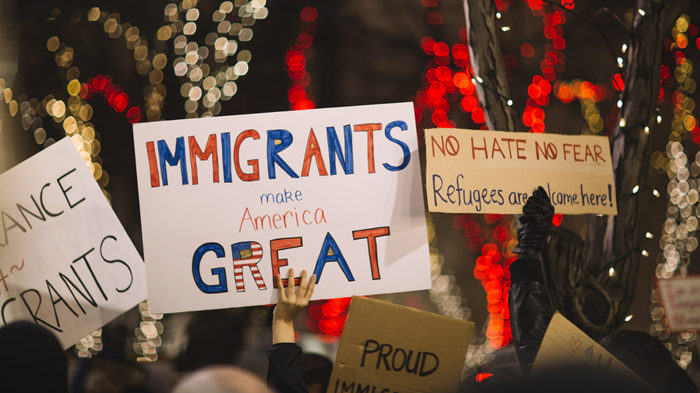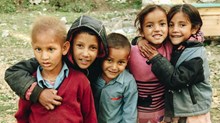It Actually is Black & White

This article was originally written in January, 2017, after President Trump passed the “Muslim ban” that blocked immigration from primarily Muslim countries. That was 5 years ago, and we watched as legal immigration and refugee resettlement were decimated under that administration. My husband and I work with refugees in the USA, and we saw the number of new arrivals slow to a trickle, then a drip, then dry up completely. If Trump had won again in 2020, we planned to move overseas and work in a refugee camp, but President Biden’s win gave us new hope. It’s July now, and so far that hope has been frustrated, deferred again and again. I understand that refugee resettlement agencies have had to cut their services to the bone, and that rebuilding takes time. But the number of refugees and internally displaced peoples (IDPs) is at an all-time high—right now, 1% of the world’s population is displaced, a breathtaking 82.4 million people. Thirty-five million of them are children.
So I’ve gone from being mostly silent on social media to speaking out against the president’s recent executive order on immigration, and this morning I got called on the carpet, so to speak, at my church. One of the pastors, very gently, wanted to have a conversation with us about how strongly we were expressing ourselves. His problem wasn’t exactly with our opinions, but with how he perceived us being critical of the church.
He’s right. We are critical of the church, by which I mean American evangelicalism in general. The church, as he rightly pointed out, is made up of broken people who have been redeemed and are all in process of being sanctified. I know that, and I also know that I fall far short myself. I tend to love my Muslim refugee neighbor to such an extent that I sometimes have a harder time loving my white suburban neighbor too, but of course both need it.
In case you can’t tell, I go to a conservative church. It’s actually a great church in many ways, filled with generous people who love Scripture. Our church loves the Bible. But it has some blind spots, and they coincidentally seem to coincide with many of the shortcomings of the Republican party.
The people at my church who are most vocal are very politically conservative. So they are reacting in a loving but conservative way to the refugee ban. They say things like, “government’s main job is to keep us safe” and “a sensible cap on numbers so we can properly care for them” and “it’s good to take a break from letting in refugees so we can really work on the vetting program and then we’ll let some of them in.” They say “those commands are for individuals and we should do that but governments have different commands.” And it’s snowing in Greece, in Jordan, in Lebanon’s Bekkah Valley, and families are sleeping on frozen ground in unheated tents, and dying of exposure, all so we can feel safer.
Refugee families who have lost everything already are losing whatever shreds of hope they had, and people who love their Bibles think God is okay with that because government’s main job is to keep us safe. Caring is optional. It’s great that I care, I’ve been told, but they don’t have to. They can care about something else. I don’t have the right to tell them what God’s heart is.
If I were fiery about abortion, these good people would applaud me–not because they see it as a Republican issue, but because they see it as morally black and white. Murder, plain and simple. They start with it being wrong and work their way on to it being partisan. But refugee care is like that. It doesn’t matter that Trump is a Republican. I couldn’t care less who created this chaos. Caring for desperate, needy people is the very heart of God, and it should be the least controversial topic at church.
My pastor talked to me about “calling.” It’s my calling to care, and that’s good, but everyone else can choose. Hear me out: I’m not saying that you as a Christian have to be involved in refugee care. You may or may not be called to go minister in refugee camps or spend your daylight hours driving recent arrivals to doctor’s appointments or grocery stores. You don’t need to march in protests if you don’t want to. BUT. You do need to care. You do need to let it inform your vote. You do need to not support practices that break families even further.
It’s not controversial. It’s not partisan. It’s right and wrong.
“What if God wants America to take a 120-day break from letting refugees in?” our pastor asked. I’m still grappling with how to respond to that, but my husband was ready. “I am not taking a break from caring for them or advocating for them,” he said. “And I don’t believe God is taking a break from them either.”
I left the meeting at the church running late for a coffee downtown with a Syrian asylum seeker. We’re friends on Facebook, so she’s seen my posts. She thanked me for, as she put it, “fighting for the Arab people.” She’s broken-hearted at the response in her church to the crisis, and she loves that I’m fiery about it. I have gotten this over and over from my refugee friends. They love that I am showing my love for them by fighting for them. They take comfort in the fact that I care so deeply about them that I’m being emotional, and that I’m taking on other people on their behalf.
And tomorrow, I will visit a woman whose mother is dying and who desperately longs to go visit, but she’s afraid to leave her house, husband and children, in case she can’t come back. My husband will continue to help a man who is trying to bring his wife and toddler here. The wife was approved a year ago but they are still waiting for the 2 year old to get through the vetting process. They all have stories for us to listen to, and they all ask us to pray for them.
But I need prayer too; that my righteous anger would be like Jesus’ and heal, not scorch.
*I’m assuming you already know that we have a very strict vetting process in place. For more information, this is a helpful article.
Elizabeth Jones is the ESL Director and Volunteer Coordinator for PDX Friends of Refugees in Portland, Oregon. She and her husband have been working with refugees in Portland since 2010. She fills her days with friends from around the world.
The Better Samaritan is a part of CT's
Blog Forum. Support the work of CT.
Subscribe and get one year free.
The views of the blogger do not necessarily reflect those of Christianity Today.






















